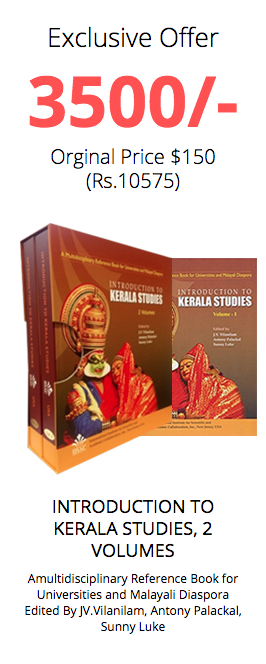
Ethnicity and Equality France in the Balance
1,120.00₹ 690.00₹
In the fall of 2005 the streets of France were rocked by civil disturbances on a scale unseen for decades. Only months earlier Azouz Begag, France’s first minister for equal opportunities and first-ever cabinet minister of North African immigrant origin, wrote an essay laying bare the festering social and ethnic injustices that, as can now be seen in hindsight, led to the riots. This essay, published here for the first time, brilliantly documents the socioeconomic inequalities, ethnic discrimination, and political neglect that have bred a volatile generation of minority ethnic youths deeply distrustful of a society they believe has failed them.
Blending autobiography with sociological and political analysis, Begag shows how social peace in France depends on transforming these disaffected youths into galvanized citizens. His insights into the malaise of France’s urban ghettos offer lessons for developed countries throughout the world—and hope for the similar challenges they face.

Native Peoples and Water Rights
5,990.00₹ 3,990.00₹
Economic developments in irrigation, agriculture, and hydroelectric power generation in western Canada at the turn of the last century challenged the way Native peoples had traditionally managed the watershed environment. Facing rapidly expanding provincial and federal power as well as private industries, Native peoples saw opportunities to protect their self-governing rights and explore reserve-based economy.
Through a combination of field work and archival research, Kenichi Matsui offers an original and pioneering overview of the evolution of water law and agricultural policies in the Canadian west. By incorporating the history of water law philosophies, water development technologies, agricultural policies, and cross-cultural theories, Matsui constructs an interdisciplinary analysis of how both Native peoples and non-native stakeholders struggled for better rights and livelihood through litigation, political campaigns, and direct actions.
The dramatic stories of early cultural, legal, and political conflict in interior British Columbia and Alberta featured in Native Peoples and Water Rights enrich our understanding of current Native rights disputes throughout North America.

Nature’s Aristocracy A Plea for the Oppressed
2,450.00₹ 1,790.00₹
In 1871 Jennie Collins became one of the first working-class American women to publish a volume of her own writings: Nature’s Aristocracy. Merging autobiography, social criticism, fictionalized vignettes, and feminist polemics, her book examines the perennial problem of class in America. Collins loosely structures her series of sketches around the argument that nineteenth-century U.S. society, by deviating dangerously from the ideals set forth in the Constitution and the Bill of Rights, had created a corrupt aristocracy and a gulf between the rich and the poor that the United States’ founders had endeavored to prevent.
Collins’s text serves as a mouthpiece for the little-heard voices of nineteenth-century poor and laboring women, employing sarcasm, irony, and sentimentality in condemning the empty philanthropic gestures of aristocratic capitalists and calling for justice instead of charity as a means to elevate the poor from their destitution. She also explores the necessity of suffrage for female workers who, while expected to work alongside men as their equals in labor, were hampered by lower wages and lack of control by their exclusion from the voting process.

Neo-nationalism in Europe and Beyond
8,400.00₹ 2,995.00₹
By the early twenty-first century neo-nationalist forces have established themselves in a number of the world’s large regions and subcontinents. From Australia to South Asia, in Eastern and Western Europe, comparable parties and movements have positioned themselves in national parliaments and governments, with some considerable impact on state power. In contrast to right-wing extremist parties in the past, these recent movements mostly operate within legal parliamentary channels, using essentialized notions of local culture to mobilize against real and alleged threats to local identities of status, gender, religion, nationhood and ethnicity. Prompted by this near-simultaneous rise to political influence of more than a dozen apparently similar parties across Western Europe, this collection offers a range of European case studies with selected global examples, such as the Front National, the late Pim Fortuyn, India and the BJP, and Pauline Hanson and her One Nation Party in Australia. It takes up the theoretical and methodological challenges posed by this phenomenon and asks what distinctive contributions anthropology might make to its study.
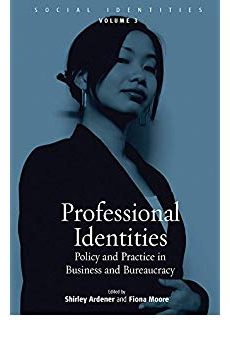
Professional Identities: Policy and Practice in Business and Bureaucracy
8,400.00₹ 1,700.00₹
In both professional and academic fields, there is increasing interest in the way in which white-collar workers engage with institutions and networks which are complex social constructions. Covering a wide variety of countries and types of organization, this volume examines the diverse ways in which individuals’ ethnic, gender, corporate and professional identities interact. This book brings together fields often viewed in isolation: ethnographies of groups traditionally studied by anthropologists in new organisational contexts, and examinations of the role of identity in corporate life, opening up new perspectives on central areas of contemporary human activity. It will be of great interest to those concerned with practical management of institutions, as well as those of us who find ourselves working within them.
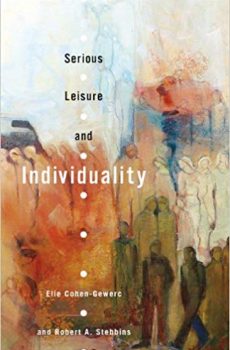
Serious, leisure and individuality
6,490.00₹ 2,990.00₹
What does it mean to be an individual and how can an individual exist within society? Serious Leisure and Individuality examines the circumstances in the modern world that make for individual distinctiveness, and the role of these conditions in personal and social life. “The individual,” said Friedrich Nietzsche, “has always had to struggle to keep from being overwhelmed by the tribe. If you try it, you will be lonely often, and sometimes frightened. But no price is too high to pay for the privilege of owning yourself.” Elie Cohen-Gewerc and Robert Stebbins explore the road to finding that privilege. They approach individuality by examining its relationship to freedom and being free, and by defining and elaborating on the concept of leisure space. They also look at individuality’s place in community, citizenship, and globalization. The complex relationship between individuality and alienation is put under the microscope to highlight the negative side of being distinctive, which has adverse consequences for the individual and society. There are many studies on the modern individual that centre almost entirely on the person facing his local community and broader society. What is missing in the literature – and what Serious Leisure and Individuality provides – is a broad, comprehensive examination of individuality, particularly as it is rooted in leisure and the leisure-like areas of work.

Social Justice
1,120.00₹ 890.00₹
How do we expand health care coverage to more Americans? Are hate crimes legislation and affirmative action fair? What sacrifices must we make to protect the environment? Is the death penalty morally acceptable? Contributors include Jill Jacobs, of Jewish Funds for Justice; Arthur Waskow, director of The Shalom Center; and TV commentator and UCLA law professor Laurie Levenson. Each volume in this series presents hypothetical cases on specific topics, followed by traditional and contemporary sources. Supplementing these are brief essays, written by contributors of various ages, backgrounds, and viewpoints to provoke lively thought and discussion. These voices from Jewish tradition and today’s Jewish community present us with new questions and perspectives, encouraging us to consider our own moral choices in a new light.
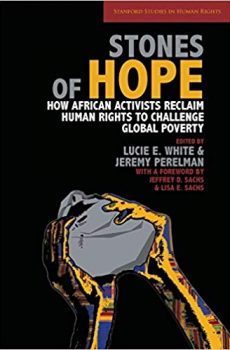
Stones of Hope
1,690.00₹ 1,290.00₹
Many human rights advocates agree that conventional advocacy tools― reporting abuses to international tribunals or shaming the perpetrators of human rights violations―have proven ineffective. Increasingly, social justice advocates are looking to social and economic rights strategies as promising avenues for change. However, widespread skepticism remains as to how to make such rights real on the ground. Stones of Hope engages with the work of remarkable African advocates who have broken out of the conventional boundaries of human rights practice to challenge radical poverty. Through a sequence of case studies and interpretive essays, it illustrates how human rights can be harnessed to generate democratic institutional innovations. Ultimately, this book brings the reader down from the heights of official human rights forums to the ground level of advocacy. It is a must-read for human rights advocates, development practitioners, students, educators, and all others interested in an equitable global society.

The Antigone Complex
3,990.00₹ 2,600.00₹
What if psychoanalysis had chosen Antigone rather than Oedipus? This book traces the relation between ethics and desire in important philosophical texts that focus on femininity and use Antigone as their model. It shows that the notion of feminine desire is conditioned by a view of women as being prone to excesses and deficiencies in relation to ethical norms and rules. Sjöholm explains Mary Wollstonecraft’s work, as well as readings of Antigone by G.W.F. Hegel, Martin Heidegger, Luce Irigaray, Jacques Lacan, and Judith Butler.
This book introduces the concept of the “Antigone complex” in order to illuminate the obscure and multifaceted question of feminine desire, which has given rise to the fascination of generations of philosophers and other theoreticians, as well as readers and spectators. At the same time the book argues for a notion of desire that is intrinsically related to ethics. The ethical question posed by Antigone, and explored in the book, is: what determines those actions that one must do, as opposed to those that one ought to do?
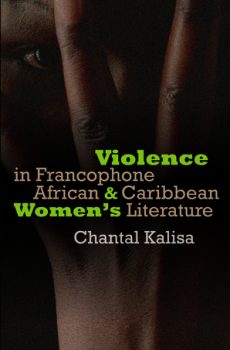
Violence in Francophone African and Caribbean Women’s Literature
3,753.00₹ 3,150.00₹
African and Caribbean peoples share a history dominated by the violent disruptions of slavery and colonialism. While much has been said about these “geographies of pain,” violence in the private sphere, particularly gendered violence, receives little attention. This book fills that void. It is a critical addition to the study of African and Caribbean women’s literatures at a time when women from these regions are actively engaged in articulating the ways in which colonial and postcolonial violence impact women.
Chantal Kalisa examines the ways in which women writers lift taboos imposed on them by their society and culture and challenge readers with their unique perspectives on violence. Comparing women from different places and times, Kalisa treats types of violence such as colonial, familial, linguistic, and war-related, specifically linked to dictatorship and genocide. She examines Caribbean writers Michele Lacrosil, Simone Schwartz-Bart, Gisèle Pineau, and Edwidge Danticat, and Africans Ken Begul, Calixthe Beyala, Nadine Bar, and Monique Ilboudo. She also includes Sembène Ousmane and Frantz Fanon for their unique contributions to the questions of violence and gender. This study advances our understanding of the attempts of African and Caribbean women writers to resolve the tension between external forms of violence and internal forms resulting from skewed cultural, social, and political rules based on gender.

